Legal and Ethical Analysis of Healthcare Relationships in Practice
VerifiedAdded on 2021/02/19
|6
|1341
|24
Report
AI Summary
This report provides a practice analysis and reflection on healthcare relationships, specifically focusing on a case study where a patient's personal information was shared with a research assistant. The analysis delves into various legal concepts including consent, informed refusal, autonomy, trespass, false imprisonment, negligence, duty of care, standard of care, confidentiality, and privacy. The report examines whether standard quality and ethical standards were adhered to, and whether the confidentiality of the patient was maintained. The conclusion summarizes the adherence and breaches of legal principles, emphasizing the importance of patient confidentiality and autonomy. The report references key sources to support its findings.
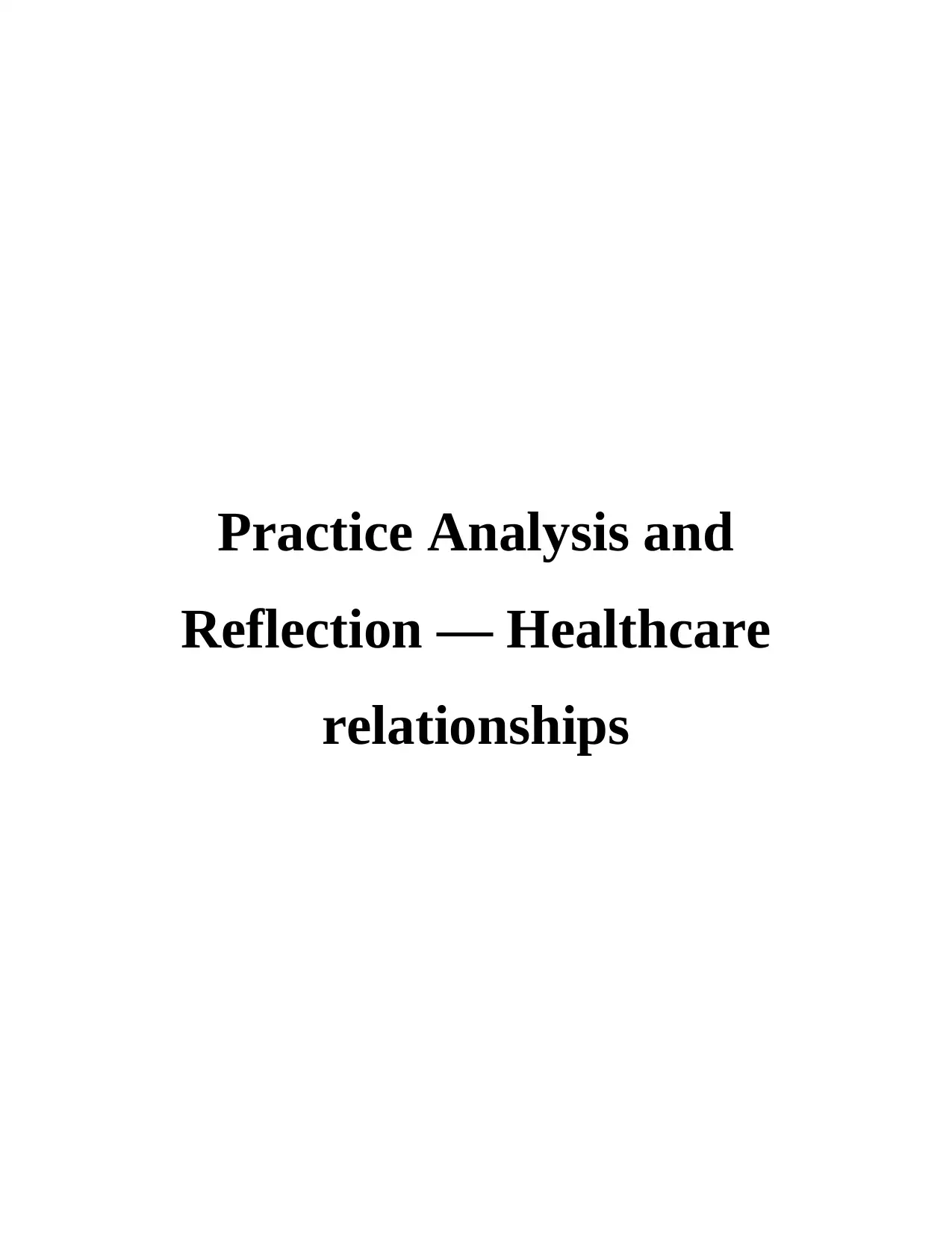
Practice Analysis and
Reflection — Healthcare
relationships
Reflection — Healthcare
relationships
Paraphrase This Document
Need a fresh take? Get an instant paraphrase of this document with our AI Paraphraser
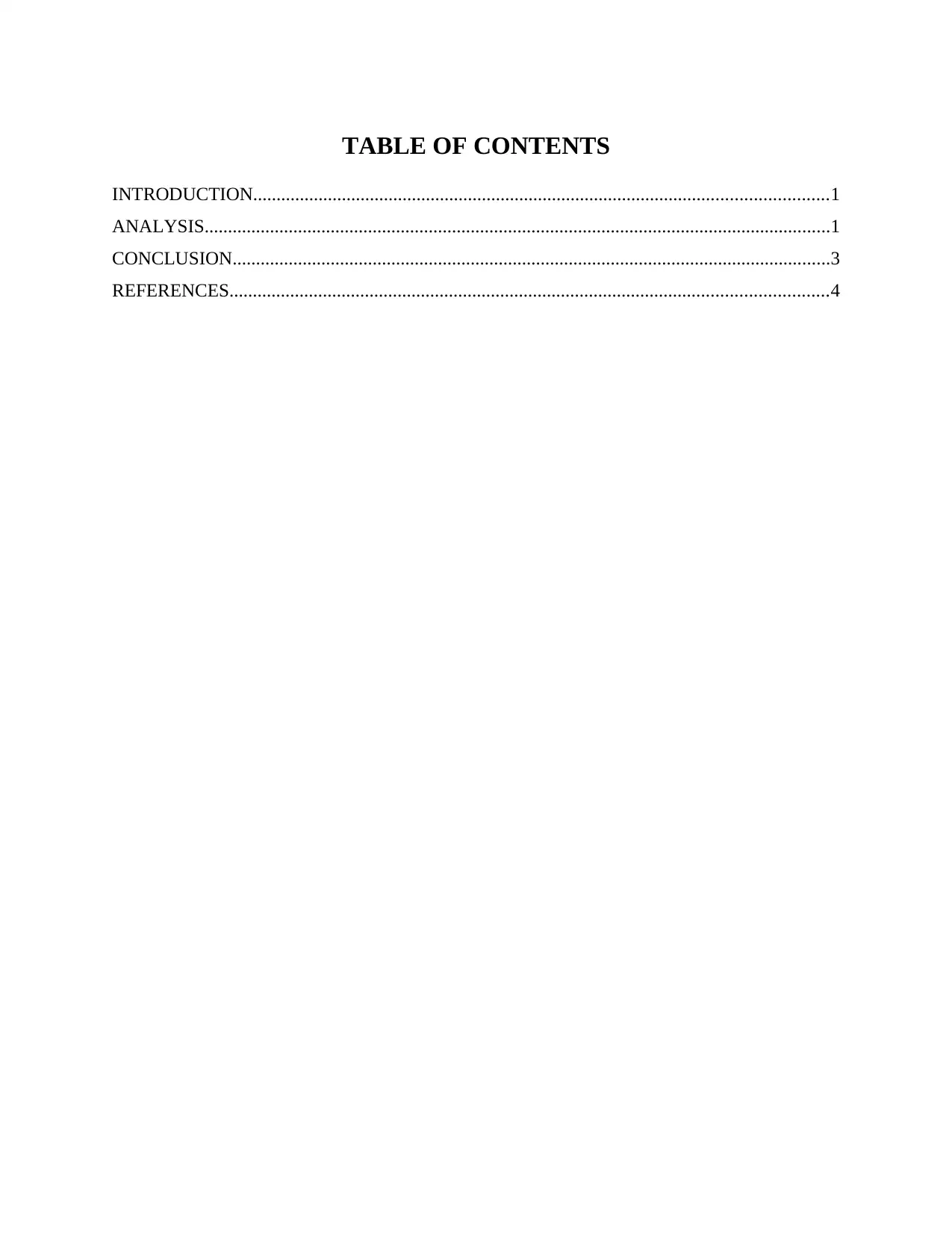
TABLE OF CONTENTS
INTRODUCTION...........................................................................................................................1
ANALYSIS......................................................................................................................................1
CONCLUSION................................................................................................................................3
REFERENCES................................................................................................................................4
INTRODUCTION...........................................................................................................................1
ANALYSIS......................................................................................................................................1
CONCLUSION................................................................................................................................3
REFERENCES................................................................................................................................4
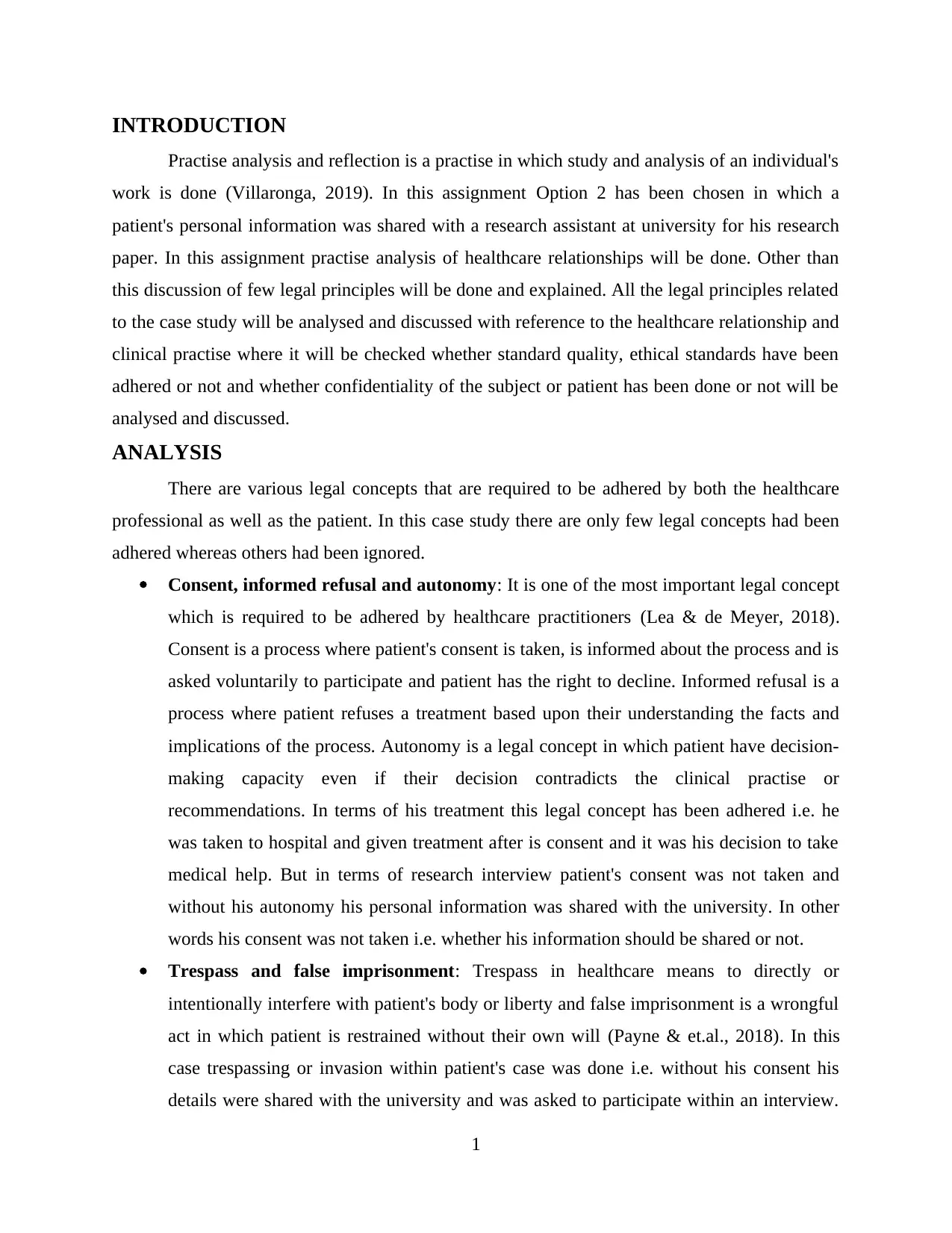
INTRODUCTION
Practise analysis and reflection is a practise in which study and analysis of an individual's
work is done (Villaronga, 2019). In this assignment Option 2 has been chosen in which a
patient's personal information was shared with a research assistant at university for his research
paper. In this assignment practise analysis of healthcare relationships will be done. Other than
this discussion of few legal principles will be done and explained. All the legal principles related
to the case study will be analysed and discussed with reference to the healthcare relationship and
clinical practise where it will be checked whether standard quality, ethical standards have been
adhered or not and whether confidentiality of the subject or patient has been done or not will be
analysed and discussed.
ANALYSIS
There are various legal concepts that are required to be adhered by both the healthcare
professional as well as the patient. In this case study there are only few legal concepts had been
adhered whereas others had been ignored.
Consent, informed refusal and autonomy: It is one of the most important legal concept
which is required to be adhered by healthcare practitioners (Lea & de Meyer, 2018).
Consent is a process where patient's consent is taken, is informed about the process and is
asked voluntarily to participate and patient has the right to decline. Informed refusal is a
process where patient refuses a treatment based upon their understanding the facts and
implications of the process. Autonomy is a legal concept in which patient have decision-
making capacity even if their decision contradicts the clinical practise or
recommendations. In terms of his treatment this legal concept has been adhered i.e. he
was taken to hospital and given treatment after is consent and it was his decision to take
medical help. But in terms of research interview patient's consent was not taken and
without his autonomy his personal information was shared with the university. In other
words his consent was not taken i.e. whether his information should be shared or not.
Trespass and false imprisonment: Trespass in healthcare means to directly or
intentionally interfere with patient's body or liberty and false imprisonment is a wrongful
act in which patient is restrained without their own will (Payne & et.al., 2018). In this
case trespassing or invasion within patient's case was done i.e. without his consent his
details were shared with the university and was asked to participate within an interview.
1
Practise analysis and reflection is a practise in which study and analysis of an individual's
work is done (Villaronga, 2019). In this assignment Option 2 has been chosen in which a
patient's personal information was shared with a research assistant at university for his research
paper. In this assignment practise analysis of healthcare relationships will be done. Other than
this discussion of few legal principles will be done and explained. All the legal principles related
to the case study will be analysed and discussed with reference to the healthcare relationship and
clinical practise where it will be checked whether standard quality, ethical standards have been
adhered or not and whether confidentiality of the subject or patient has been done or not will be
analysed and discussed.
ANALYSIS
There are various legal concepts that are required to be adhered by both the healthcare
professional as well as the patient. In this case study there are only few legal concepts had been
adhered whereas others had been ignored.
Consent, informed refusal and autonomy: It is one of the most important legal concept
which is required to be adhered by healthcare practitioners (Lea & de Meyer, 2018).
Consent is a process where patient's consent is taken, is informed about the process and is
asked voluntarily to participate and patient has the right to decline. Informed refusal is a
process where patient refuses a treatment based upon their understanding the facts and
implications of the process. Autonomy is a legal concept in which patient have decision-
making capacity even if their decision contradicts the clinical practise or
recommendations. In terms of his treatment this legal concept has been adhered i.e. he
was taken to hospital and given treatment after is consent and it was his decision to take
medical help. But in terms of research interview patient's consent was not taken and
without his autonomy his personal information was shared with the university. In other
words his consent was not taken i.e. whether his information should be shared or not.
Trespass and false imprisonment: Trespass in healthcare means to directly or
intentionally interfere with patient's body or liberty and false imprisonment is a wrongful
act in which patient is restrained without their own will (Payne & et.al., 2018). In this
case trespassing or invasion within patient's case was done i.e. without his consent his
details were shared with the university and was asked to participate within an interview.
1
⊘ This is a preview!⊘
Do you want full access?
Subscribe today to unlock all pages.

Trusted by 1+ million students worldwide
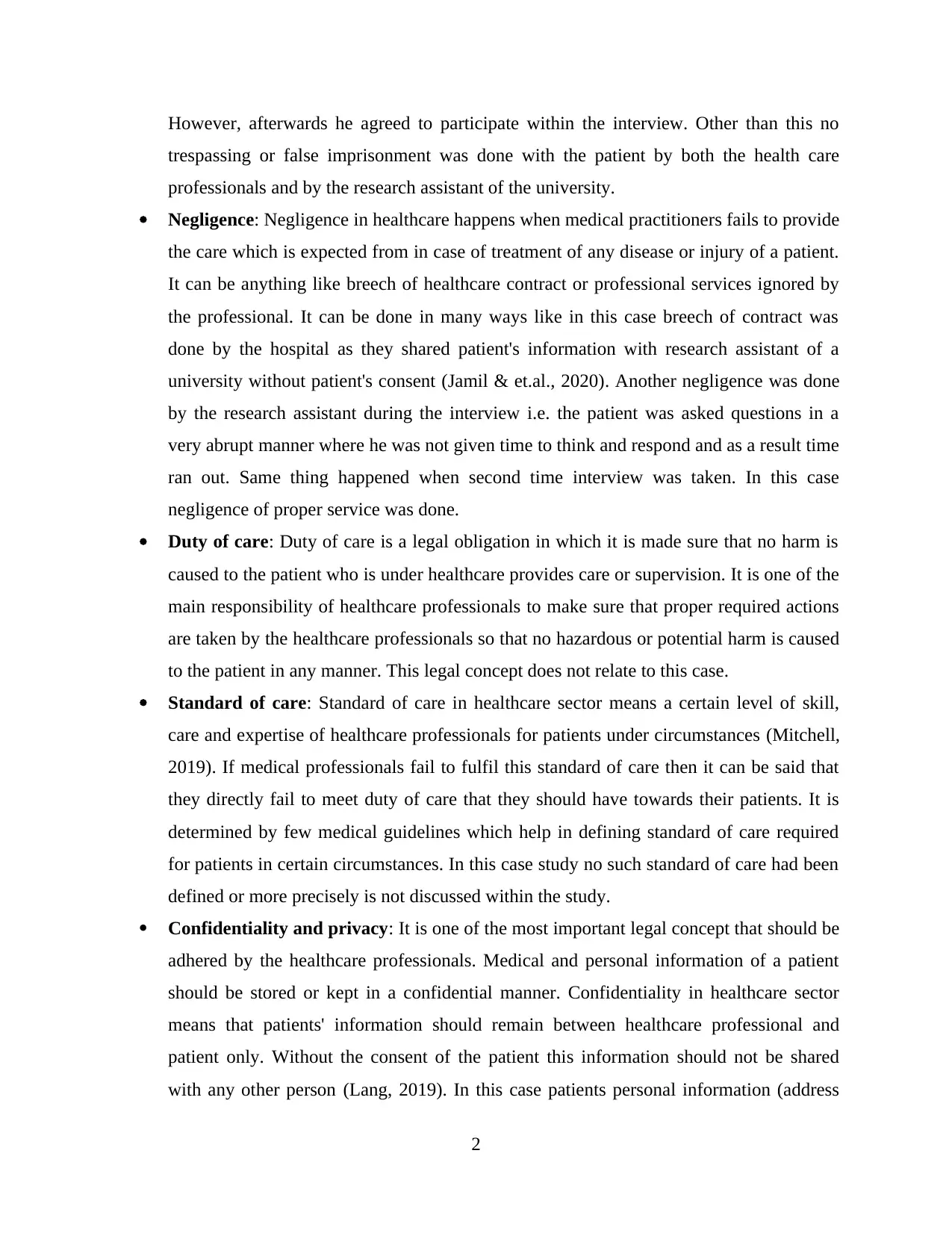
However, afterwards he agreed to participate within the interview. Other than this no
trespassing or false imprisonment was done with the patient by both the health care
professionals and by the research assistant of the university.
Negligence: Negligence in healthcare happens when medical practitioners fails to provide
the care which is expected from in case of treatment of any disease or injury of a patient.
It can be anything like breech of healthcare contract or professional services ignored by
the professional. It can be done in many ways like in this case breech of contract was
done by the hospital as they shared patient's information with research assistant of a
university without patient's consent (Jamil & et.al., 2020). Another negligence was done
by the research assistant during the interview i.e. the patient was asked questions in a
very abrupt manner where he was not given time to think and respond and as a result time
ran out. Same thing happened when second time interview was taken. In this case
negligence of proper service was done.
Duty of care: Duty of care is a legal obligation in which it is made sure that no harm is
caused to the patient who is under healthcare provides care or supervision. It is one of the
main responsibility of healthcare professionals to make sure that proper required actions
are taken by the healthcare professionals so that no hazardous or potential harm is caused
to the patient in any manner. This legal concept does not relate to this case.
Standard of care: Standard of care in healthcare sector means a certain level of skill,
care and expertise of healthcare professionals for patients under circumstances (Mitchell,
2019). If medical professionals fail to fulfil this standard of care then it can be said that
they directly fail to meet duty of care that they should have towards their patients. It is
determined by few medical guidelines which help in defining standard of care required
for patients in certain circumstances. In this case study no such standard of care had been
defined or more precisely is not discussed within the study.
Confidentiality and privacy: It is one of the most important legal concept that should be
adhered by the healthcare professionals. Medical and personal information of a patient
should be stored or kept in a confidential manner. Confidentiality in healthcare sector
means that patients' information should remain between healthcare professional and
patient only. Without the consent of the patient this information should not be shared
with any other person (Lang, 2019). In this case patients personal information (address
2
trespassing or false imprisonment was done with the patient by both the health care
professionals and by the research assistant of the university.
Negligence: Negligence in healthcare happens when medical practitioners fails to provide
the care which is expected from in case of treatment of any disease or injury of a patient.
It can be anything like breech of healthcare contract or professional services ignored by
the professional. It can be done in many ways like in this case breech of contract was
done by the hospital as they shared patient's information with research assistant of a
university without patient's consent (Jamil & et.al., 2020). Another negligence was done
by the research assistant during the interview i.e. the patient was asked questions in a
very abrupt manner where he was not given time to think and respond and as a result time
ran out. Same thing happened when second time interview was taken. In this case
negligence of proper service was done.
Duty of care: Duty of care is a legal obligation in which it is made sure that no harm is
caused to the patient who is under healthcare provides care or supervision. It is one of the
main responsibility of healthcare professionals to make sure that proper required actions
are taken by the healthcare professionals so that no hazardous or potential harm is caused
to the patient in any manner. This legal concept does not relate to this case.
Standard of care: Standard of care in healthcare sector means a certain level of skill,
care and expertise of healthcare professionals for patients under circumstances (Mitchell,
2019). If medical professionals fail to fulfil this standard of care then it can be said that
they directly fail to meet duty of care that they should have towards their patients. It is
determined by few medical guidelines which help in defining standard of care required
for patients in certain circumstances. In this case study no such standard of care had been
defined or more precisely is not discussed within the study.
Confidentiality and privacy: It is one of the most important legal concept that should be
adhered by the healthcare professionals. Medical and personal information of a patient
should be stored or kept in a confidential manner. Confidentiality in healthcare sector
means that patients' information should remain between healthcare professional and
patient only. Without the consent of the patient this information should not be shared
with any other person (Lang, 2019). In this case patients personal information (address
2
Paraphrase This Document
Need a fresh take? Get an instant paraphrase of this document with our AI Paraphraser
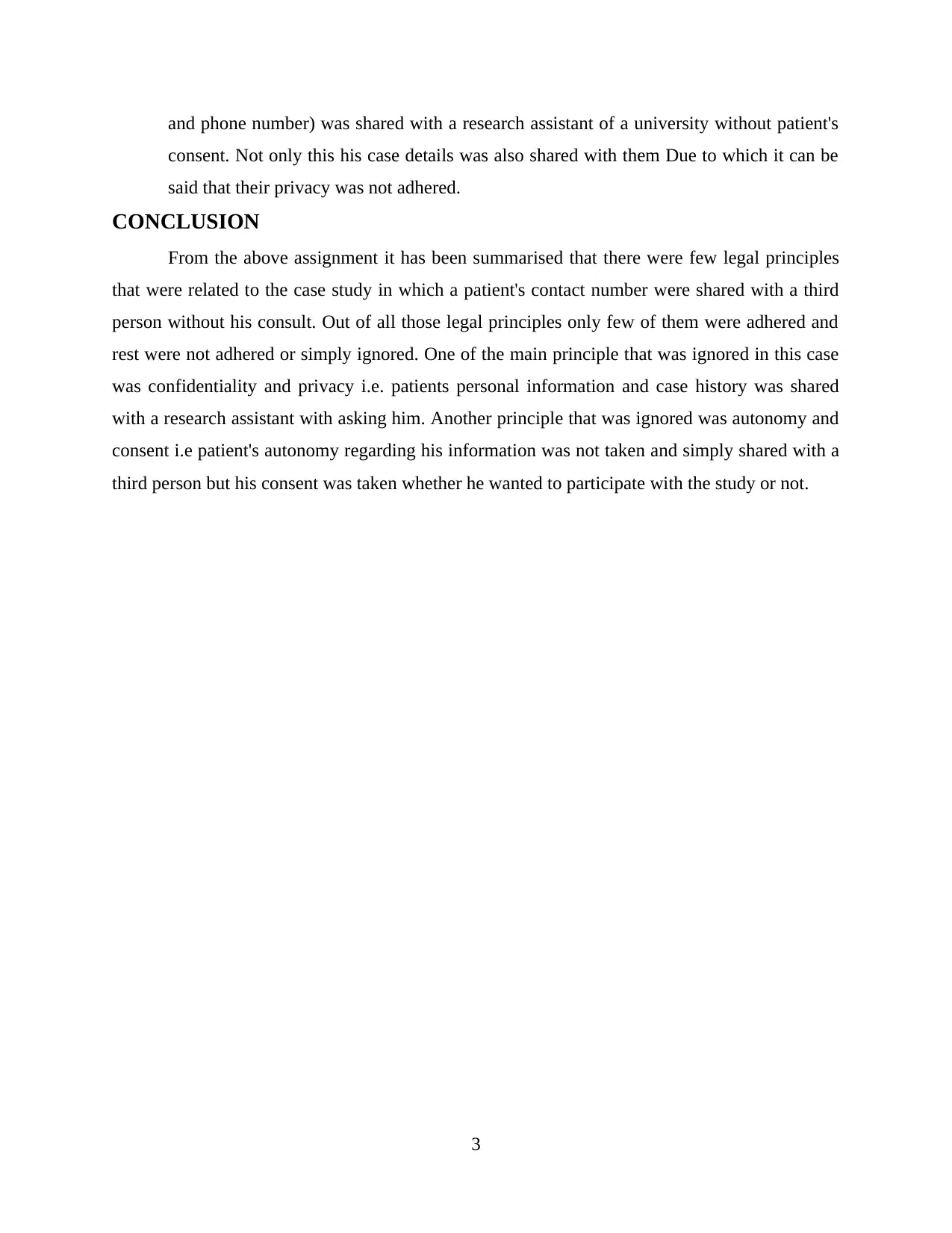
and phone number) was shared with a research assistant of a university without patient's
consent. Not only this his case details was also shared with them Due to which it can be
said that their privacy was not adhered.
CONCLUSION
From the above assignment it has been summarised that there were few legal principles
that were related to the case study in which a patient's contact number were shared with a third
person without his consult. Out of all those legal principles only few of them were adhered and
rest were not adhered or simply ignored. One of the main principle that was ignored in this case
was confidentiality and privacy i.e. patients personal information and case history was shared
with a research assistant with asking him. Another principle that was ignored was autonomy and
consent i.e patient's autonomy regarding his information was not taken and simply shared with a
third person but his consent was taken whether he wanted to participate with the study or not.
3
consent. Not only this his case details was also shared with them Due to which it can be
said that their privacy was not adhered.
CONCLUSION
From the above assignment it has been summarised that there were few legal principles
that were related to the case study in which a patient's contact number were shared with a third
person without his consult. Out of all those legal principles only few of them were adhered and
rest were not adhered or simply ignored. One of the main principle that was ignored in this case
was confidentiality and privacy i.e. patients personal information and case history was shared
with a research assistant with asking him. Another principle that was ignored was autonomy and
consent i.e patient's autonomy regarding his information was not taken and simply shared with a
third person but his consent was taken whether he wanted to participate with the study or not.
3
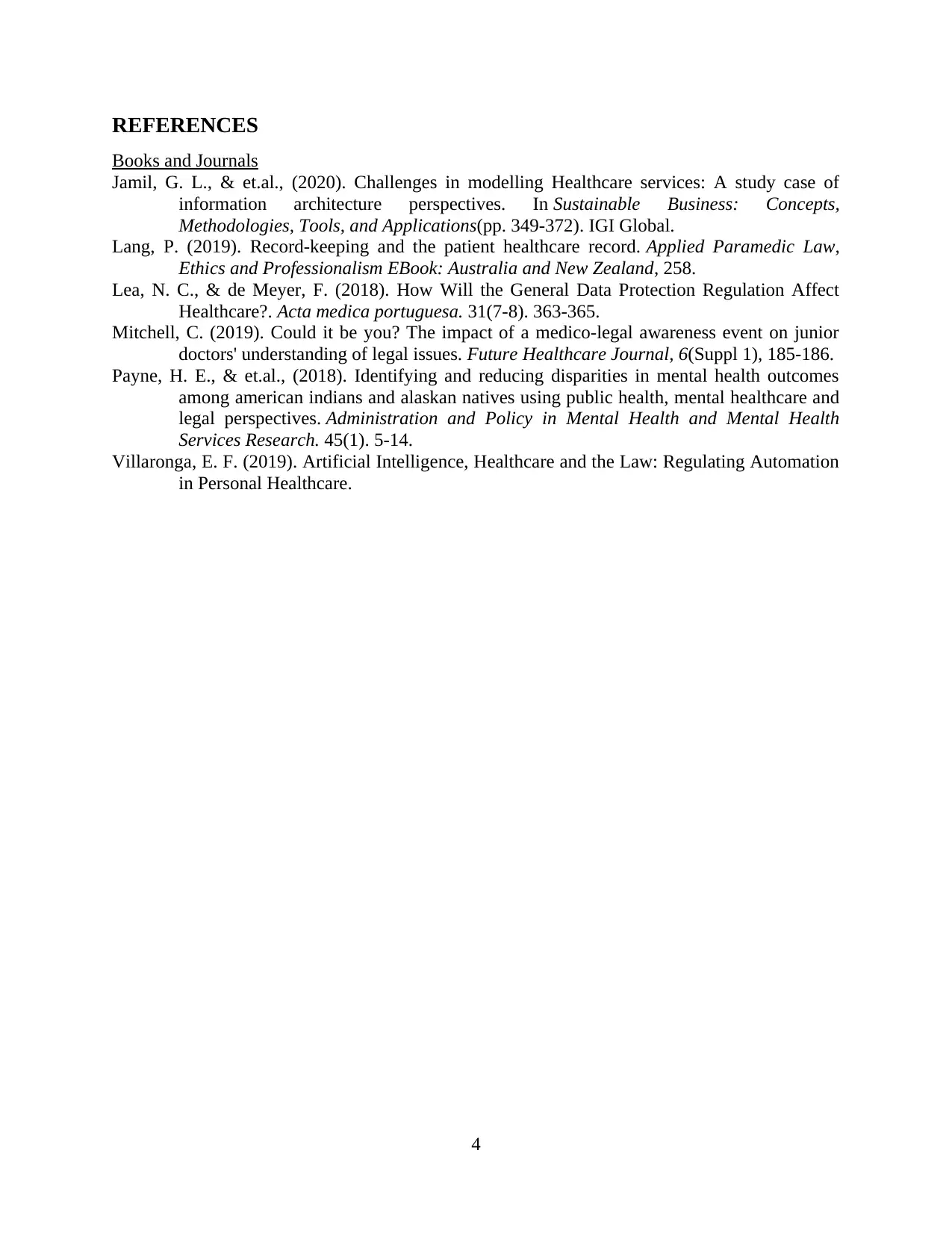
REFERENCES
Books and Journals
Jamil, G. L., & et.al., (2020). Challenges in modelling Healthcare services: A study case of
information architecture perspectives. In Sustainable Business: Concepts,
Methodologies, Tools, and Applications(pp. 349-372). IGI Global.
Lang, P. (2019). Record-keeping and the patient healthcare record. Applied Paramedic Law,
Ethics and Professionalism EBook: Australia and New Zealand, 258.
Lea, N. C., & de Meyer, F. (2018). How Will the General Data Protection Regulation Affect
Healthcare?. Acta medica portuguesa. 31(7-8). 363-365.
Mitchell, C. (2019). Could it be you? The impact of a medico-legal awareness event on junior
doctors' understanding of legal issues. Future Healthcare Journal, 6(Suppl 1), 185-186.
Payne, H. E., & et.al., (2018). Identifying and reducing disparities in mental health outcomes
among american indians and alaskan natives using public health, mental healthcare and
legal perspectives. Administration and Policy in Mental Health and Mental Health
Services Research. 45(1). 5-14.
Villaronga, E. F. (2019). Artificial Intelligence, Healthcare and the Law: Regulating Automation
in Personal Healthcare.
4
Books and Journals
Jamil, G. L., & et.al., (2020). Challenges in modelling Healthcare services: A study case of
information architecture perspectives. In Sustainable Business: Concepts,
Methodologies, Tools, and Applications(pp. 349-372). IGI Global.
Lang, P. (2019). Record-keeping and the patient healthcare record. Applied Paramedic Law,
Ethics and Professionalism EBook: Australia and New Zealand, 258.
Lea, N. C., & de Meyer, F. (2018). How Will the General Data Protection Regulation Affect
Healthcare?. Acta medica portuguesa. 31(7-8). 363-365.
Mitchell, C. (2019). Could it be you? The impact of a medico-legal awareness event on junior
doctors' understanding of legal issues. Future Healthcare Journal, 6(Suppl 1), 185-186.
Payne, H. E., & et.al., (2018). Identifying and reducing disparities in mental health outcomes
among american indians and alaskan natives using public health, mental healthcare and
legal perspectives. Administration and Policy in Mental Health and Mental Health
Services Research. 45(1). 5-14.
Villaronga, E. F. (2019). Artificial Intelligence, Healthcare and the Law: Regulating Automation
in Personal Healthcare.
4
⊘ This is a preview!⊘
Do you want full access?
Subscribe today to unlock all pages.

Trusted by 1+ million students worldwide
1 out of 6
Related Documents
Your All-in-One AI-Powered Toolkit for Academic Success.
+13062052269
info@desklib.com
Available 24*7 on WhatsApp / Email
![[object Object]](/_next/static/media/star-bottom.7253800d.svg)
Unlock your academic potential
Copyright © 2020–2025 A2Z Services. All Rights Reserved. Developed and managed by ZUCOL.





